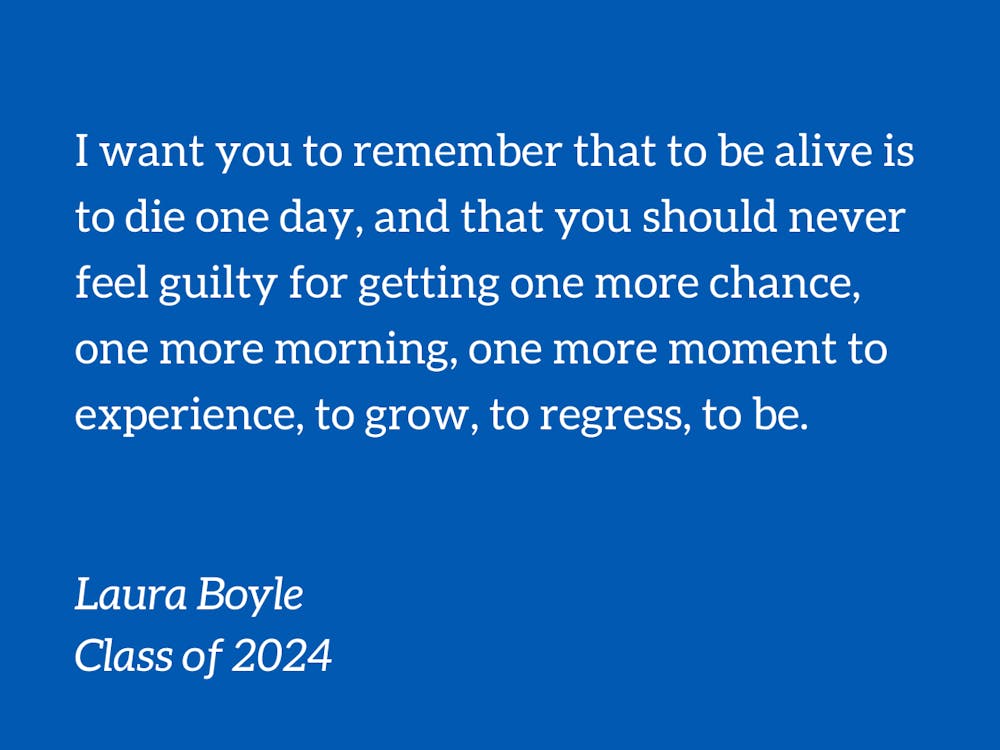When I turned twenty, I cried twice, first because I was scared of the size of the number, and second, because my brother’s friend died of an overdose that night. Every time another year is added on to my age, I feel more disconnected from myself. I still don’t understand how I could already be fourteen, let alone seventeen, let alone twenty.
Yet, twenty is so young—far too young to die. As each year passes, by some awful coincidence or, more likely, by the corrupting effects of time, more people I know pass away. I still remember my first real experience of grief, when I was eleven and I learned my good friend from first grade died of cancer. Having moved states too young to have social media, we hadn’t spoken in years. I had held an image of her in my head, as she was, seven years old and smiling, sharing a panda-themed snack, wearing all pink. I had returned to her image rather infrequently since I had moved, and yet, it was entirely life-shattering to learn that she was gone, to think of her parents and her sister, to imagine her in so much pain. It was then that I encountered death in life for the first time, and it was then that I began to ponder mortality obsessively.
At twelve, I cried to my parents one morning about how they would, one day, die. At fourteen, I threw up because I thought too much about eternity. For many years I begged for forgiveness from God because I thought that, by not turning the lamp on and off the correct number of times, my family would die. And though I have learned how to manage many of these intrusive thoughts, the pattern remains today. Even as I write now, I worry that by even writing the words “family” and “death” in the same sentence, I could write it into existence.
Guilt is a many-faced thing. It has made me do many things I am proud of—namely, apologizing—but it has made me do many more that I regret. I no longer emerge red and shaking from my room every morning repenting for some fleeting thought that wasn’t truly mine, but I do spend restless hours wondering why it is my friends or my family, and not me, who suffer, who get sick, and who die. And as I begin this new decade of my life, I feel guilty because it was my childhood friend who was terminally ill, and not me. I feel guilty for not spending more time with another terminally ill friend, who was diagnosed at twenty. I feel guilty because it was my dog who had melanoma, and not me. I feel guilty because I didn’t somehow stop one of my brother’s best friends from trying drugs for the first time.
And yet, I am not powerless. I have spoken up when it mattered, I have comforted friends in their darkest hours, I have held family as they cried, and I have shown people I love them.
Most people are aware, at least superficially, that they will die one day—unless you ask my brother, who insists we “can’t be sure yet.” And, though we admit intellectually or theoretically that we, too, will die, do we really know it? I feel that I grapple with my mortality far too much, and yet, not enough—at least, not in the ways that matter. I live most of my days forgetting—or instead choosing not to remember—that I will not always be alive. Yet, the more I think about terminal illnesses, the more I realize that one of the most upsetting parts of the “terminal” designation is that it forces us to truly reckon with mortality, with the notion that we will die, and our loved ones will die, and everyone we know will die. Of course, to be young and to know you will never grow old is awful. I do not want to denigrate the tremendous and devastating magnitude of being terminally ill. But I do want us to think of our lives as terminal, in some sense, of ourselves as expiring, whether or not we know the expiration date. I say this not to be dark or depressing or distressing, but to encourage us all—not least of all myself—to know our mortality, and to react in meaningful ways.
If, to you, living in spite of morality means living in purposeful ignorance of death, then that is what you must do. If it means reminding yourself of the quickness of life, then so be it. I’m not really sure if I have a particular point I want to get across here, except that I want you to remember that to be alive is to die one day, and that you should never feel guilty for getting one more chance, one more morning, one more moment to experience, to grow, to regress, to be. Instead of going to bed at night imagining the worst, I ask myself to try to assume the best will happen. I’m scared of getting older, I’m scared of not getting older, but most of all, I’m scared of letting either of those fears control my life.
Laura Boyle is a Trinity third-year. Her column runs on alternate Wednesdays.
Get The Chronicle straight to your inbox
Signup for our weekly newsletter. Cancel at any time.

